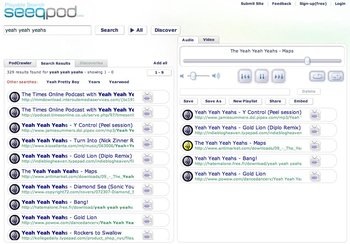 SeeqPod, the novel and handy playable music search engine, is being sued by Warner Music for violating the Digital Millennium Copyright Act (DMCA), only there’s a twist. SeeqPod isn’t necessarily doing anything wrong: It is not hosting any copyright infringing music.
SeeqPod, the novel and handy playable music search engine, is being sued by Warner Music for violating the Digital Millennium Copyright Act (DMCA), only there’s a twist. SeeqPod isn’t necessarily doing anything wrong: It is not hosting any copyright infringing music.
With SeeqPod music fans can search the Web for artists they are interested in, turning up not only official recordings from bands but EPs, rare tracks, and music recorded by fans at concerts, with varying levels of quality. Users can browse the results, create a playlist, save it, share it, and listen to the tracks right in the browser.
 SeeqPod, in business since May 2007, claims not to be liable for any copyright infringement since they are pointing to other files on the Internet and not hosting the content directly. SeeqPod isn’t always complete, offering whatever tracks are available and not complete albums.
SeeqPod, in business since May 2007, claims not to be liable for any copyright infringement since they are pointing to other files on the Internet and not hosting the content directly. SeeqPod isn’t always complete, offering whatever tracks are available and not complete albums.
Warner sees it differently, stating in the lawsuit that SeeqPod is an “unlawful music service that directly engages in, encourages, and facilitates the mass infringement of Plaintiffs’ and other intellectual property owners’ copyrighted works.”
SeeqPod does not have explicit agreements with the record labels like Last.fm or Imeem and is counting on the protection of the DCMA’s “safe harbor” provision to protect it. SeeqPod faces charges of both direct and secondary infringement with potential penalties of up to $150,000 per song.
As Ars Technica notes, the safe harbor principle is the same one that prevents major search engines like Google or Yahoo from being sued every time they link to copyrighted content like music. Warner suggests that search engines like SeeqPod do not qualify
Fred von Lohmann of the Electronic Frontier Foundation (EFF), sees the SeeqPod case as different because it is “among the first that directly tests how copyright law applies to search engines.”
“As search engines become more specialized and capable, certain copyright owners have become increasingly dissatisfied with the notice-and-takedown bargain struck in the DMCA,” Lohmann writes. “That’s what these lawsuits are really about — the defendants are complying with the letter of the law, but copyright owners are now trying to change the rules in court.”
Just when you think the record labels are starting to see the big picture, maybe getting some sense in their thick skulls — they are at least experimenting with selling music free of copyright protection though AmazonMP3. Then they do this.
Problem is, Warner has deep pockets, SeeqPod probably doesn’t. So in the end, SeeqPod gives in, settles, maybe even closes up shop. And music fans — the ones who buy music from Warner — lose a novel Web 2.0 service and are screwed again.
